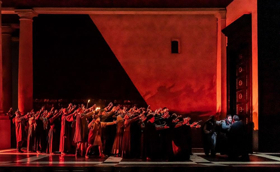Review: SIMON BOCCANEGRA, The Royal Opera House

![]() I can confirm that 25 years ago, one of the most dangerous ways to spend time in Genoa was motorcycling in its traffic, but 650 years ago, it was politicking that put one's life on the line.
I can confirm that 25 years ago, one of the most dangerous ways to spend time in Genoa was motorcycling in its traffic, but 650 years ago, it was politicking that put one's life on the line.
After a couple of decades as the city's Doge, Simon Boccanegra had seen off many of his opponents - but not quite all (it was ever thus in Italy) - but his past is catching up with him. Old debts are being called in, old jealousy curdling into new hate and old enmities reinvigorated by new facts. The people's grumblings, as they are wont to do especially in restless port cities, are metastasising into a revolutionary fervour and an old man must reassess friends and foes in a changing light, execute statecraft under pressure and deal with a personal history joyfully, but dangerously, revealed.
This production revives Elijah Moshinsky's 1991 staging of the Verdi's 1881 version of the opera and there's a real sense of traditional solidity about the work. Michael Yeargan's sets, with their columns and polished floors, suggest both the resilience of Genoa's mercantile wealth, but also the walls within which the Doge, and specifically his long lost daughter, Amelia, must live. The man who made his reputation quelling piracy on the high seas has long since settled for life in palaces constructed on firm foundations, the storms assailing him now political rather than meteorological.
Carlos Álvarez's beefy baritone, heavy beard and comfortable frame convinces as both the man of action whose ruthless grasp on the throne has built his position of power and, as the father whose pain of separation from his daughter combines with age to humanise him in our eyes. He is still a tyrant, but there's a pathos emerging in his decline, no Lear yet, that degeneration cut short by assassination.
Much of that emotional terrain is brought to light by Hrachuhi Bassenz's Amelia, estranged for so long from her father, but sharing his headstrong certainty, particularly in her love of the impulsive, mercurial Adorno, wonderfully sung by Francesco Meli.
Ferruccio Furlanetto's Fiesco is connected to the Doge in ways that become clear, the two alpha males butting up against each other in a city-state that ain't big enough for the both of us. Each see plenty of the other's strengths and weaknesses in their own personalities, their lives so easily playing out one for the other had the dice fallen differently.
Lurking, his envy festering, Mark Ruckner gives us an Iago-like Albani who does not get the girl, but does get his man, even as he stands in the shadows of his own gallows.
If it all feels a little static (compared with the Founding Fathers jumping and jiving just across town in Hamilton), there's a beauty in watching so many scenes unfold with what could be National Gallery paintings miraculously animated by music and singing. The opulence of the costumes worn by the chorus repay the visit alone and the orchestra, under Henrik Nánási, enjoy a richness of tone that reminds you why grand opera is so very grand.
At the curtain, jolted back from mediaeval Liguria to modern London, the headlines in the newspapers show that not much has changed in politics - perhaps it never will.
Simon Boccanegra continues at the Royal Opera House until 10 December.
Photo Clive Barda
Reader Reviews
Videos

